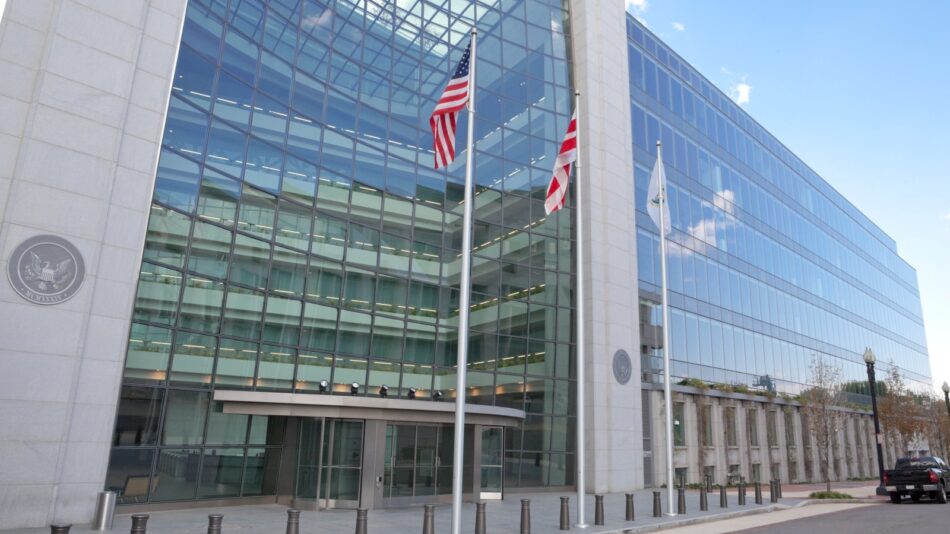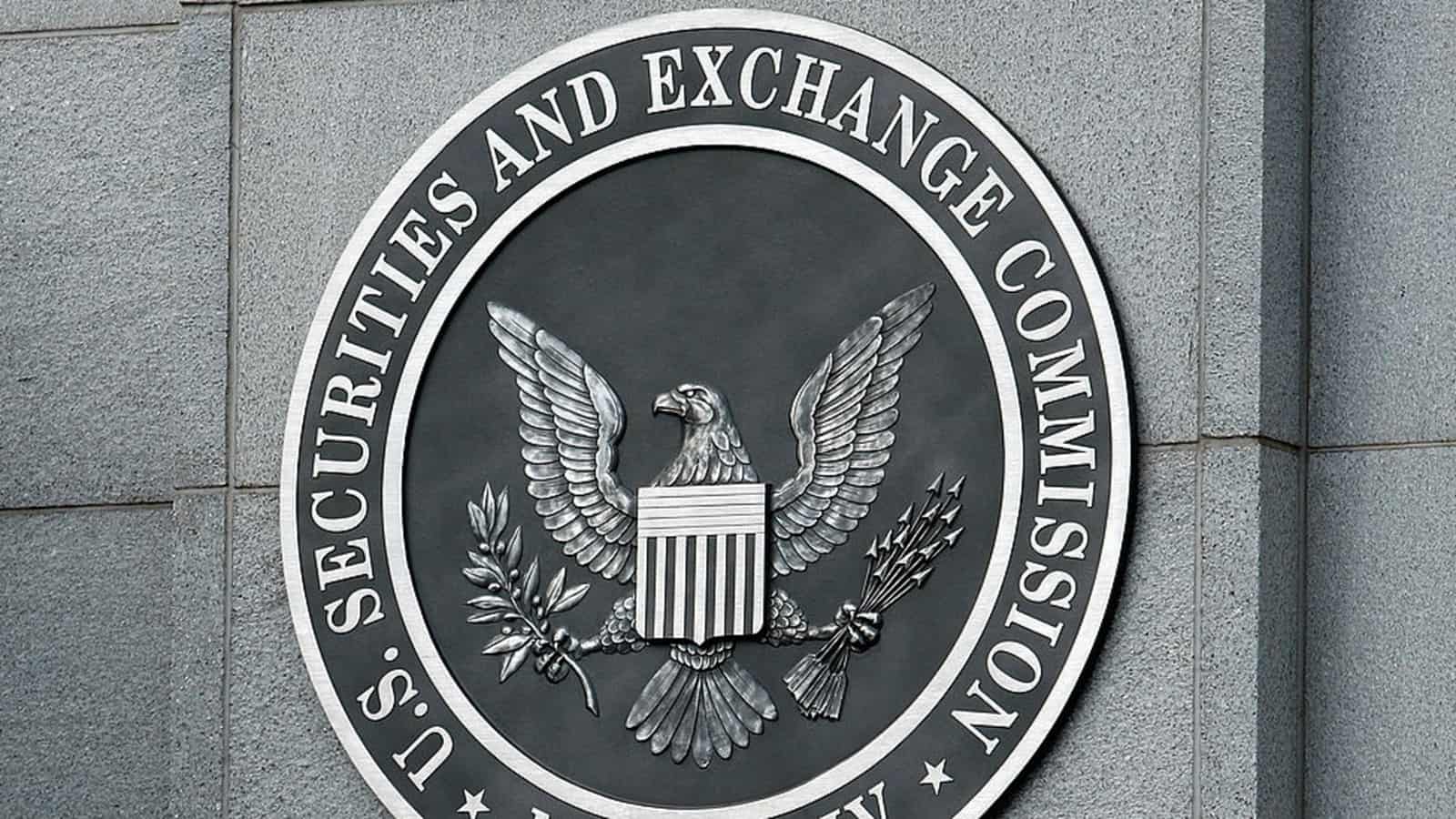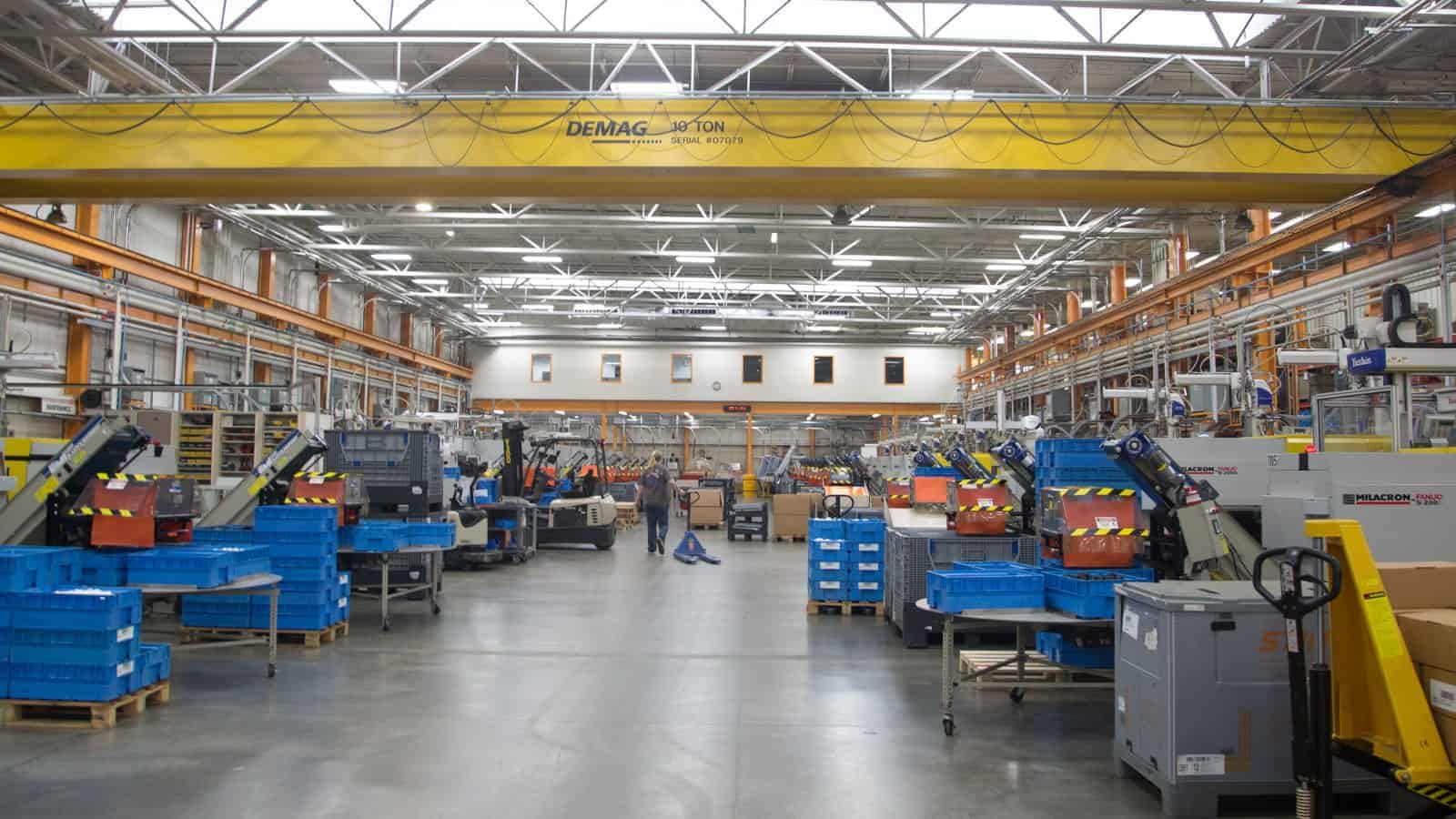Manufacturers to Sue SEC on Proxy Advisory Firm Rule
“The SEC has offered no justification for abandoning a decade’s worth of bipartisan, consensus-driven policymaking”
Washington, D.C. – Following the Securities and Exchange Commission’s announcement that it is rescinding critical reforms designed to protect publicly traded manufacturers and their investors from unregulated and unaccountable “proxy advisory firms,” National Association of Manufacturers President and CEO Jay Timmons released the following statement:
“The SEC has offered no justification for abandoning a decade’s worth of bipartisan, consensus-driven policymaking. This move will undoubtedly harm the competitiveness of publicly traded manufacturers, and it will hurt Main Street investors. The SEC’s decision to change course without allowing the 2020 rule to take effect and be fairly evaluated epitomizes ‘arbitrary and capricious’ rulemaking. The NAM will be filing suit in the coming weeks to preserve the 2020 rule’s commonsense reforms and protect manufacturers from proxy advisory firms’ outsized influence.”
Background:
The NAM has long called for increased oversight of proxy advisory firms. In July 2020, the SEC issued final regulations to enhance transparency and accountability for proxy firms, a move Timmons called a “long-sought, major win for the industry and millions of manufacturing workers.” In October 2020, the NAM filed a motion to intervene in ISS v. SEC (ISS’s attempt to overturn the rule) in support of these reforms.
In June 2021, the SEC announced that it was suspending enforcement of the 2020 rule; the NAM voiced concern about the agency’s “efforts to bypass the required notice-and-comment process to keep this lawfully issued rule on ice indefinitely.” The NAM filed suit against the SEC in October 2021 challenging this unlawful suspension. Oral arguments in NAM v. SEC took place in May 2022.
In November 2021, the SEC proposed to rescind critical portions of the 2020 rule, a move the NAM called “deeply troubling.” The NAM filed comment opposing the recission proposal in December 2021.
-NAM-
The National Association of Manufacturers is the largest manufacturing association in the United States, representing small and large manufacturers in every industrial sector and in all 50 states. Manufacturing employs more than 12.7 million men and women, contributes $2.71 trillion to the U.S. economy annually and accounts for 58% of private-sector research and development. The NAM is the powerful voice of the manufacturing community and the leading advocate for a policy agenda that helps manufacturers compete in the global economy and create jobs across the United States. For more information about the NAM or to follow us on Twitter and Facebook, please visit www.nam.org.
Manufacturers: Court’s Decision Affirms EPA’s Authority to Issue Appropriate Greenhouse Gas Regulations
Washington, D.C. – Following the Supreme Court’s 6–3 decision in West Virginia vs. EPA, National Association of Manufacturers President and CEO Jay Timmons released the following statement:
“Manufacturers share a deep commitment to protecting our planet and our people, and manufacturing innovation holds the key to solving the generational challenge of climate change. The court’s decision affirms the Environmental Protection Agency’s authority to issue appropriate greenhouse gas regulations while providing a reminder that the agency must stay within the guardrails delegated by Congress. As some of the largest electricity consumers and as electricity generators, manufacturers are ready to work with the EPA to deliver innovative and balanced solutions that protect our environment and our competitiveness as it considers next steps.”
Background: Earlier this week, the NAM along with 42 state partners sent President Biden a letter highlighting the importance of affordable, reliable electricity for manufacturers to remain competitive. It signals manufacturers’ eagerness to work with policymakers on the important decisions and planning surrounding the future of the electrical grid and broader energy policy.
-NAM-
The National Association of Manufacturers is the largest manufacturing association in the United States, representing small and large manufacturers in every industrial sector and in all 50 states. Manufacturing employs more than 12.7 million men and women, contributes $2.71 trillion to the U.S. economy annually and accounts for 58% of private-sector research and development. The NAM is the powerful voice of the manufacturing community and the leading advocate for a policy agenda that helps manufacturers compete in the global economy and create jobs across the United States. For more information about the NAM or to follow us on Twitter and Facebook, please visit www.nam.org
New Unionization Changes Could Harm Manufacturers

An ongoing push for new unionization policies would be damaging for manufacturers and their workforces, and the NAM is leading the fight against them. NAM Director of Labor and Employment Policy Brian Walsh recently laid out what these efforts are and what they mean for the manufacturing industry.
The background: Recent unionization efforts at major corporations like Starbucks and Amazon have gained headlines across the US. But, according to Walsh, these movements are part of a much broader effort:
- “Where manufacturers should be really concerned…is the possible changes to union-organizing activity through legislation, such as the PRO Act, or through decisions from the National Labor Relations Board that will change current interpretations of labor law and enact card check nationwide,” said Walsh.
Card check: In case you aren’t familiar with it, card check is an alternative to the secret ballot elections that are required to occur with federal oversight.
- To begin the unionization process, card check efforts require over 50% of employees to sign a card indicating their interest in forming a union. Card check proposals also jeopardize employees’ right to privately cast their ballots and could lead to less secure union elections, according to Walsh.
- “The NLRB’s General Counsel, Jennifer Abruzzo, aims to overturn longstanding practices surrounding union elections and card check policies,” added Walsh. “She has also called for overruling prior standards that have given employers the right to speak to their employees on union organizing. This would be devastating for employers.”
PRO Act: “Manufacturers support workers’ federally protected right to collectively bargain, but the Protecting the Right to Organize Act would hurt relationships between employers and employees by allowing unions to access personal employee information in union-organizing drives,” said Walsh.
- “It is also another way to eliminate the secret ballot by taking away the ability for workers to privately cast their votes in a union election. This makes a worker’s vote known on a physical card for union organizers and their co-workers to see—making them susceptible to pressure campaigns.”
The NAM in action: The NAM is advocating against these policies and has been successful at holding back the PRO Act in the Senate.
- Most recently, the NAM has been leading a campaign to make sure that card check language is not included in Congress’ final China competition bill.
What’s ahead: “Because of the composition of the NLRB, we expect many cases to be decided against employers,” said Walsh. “This is where the work of the NAM Legal Center is going to be really important in our efforts to beat back union tactics. We will be engaged in NLRB proceedings—and are prepared to go to court when necessary.”
Get involved: To take action on this issue, go here.
NAM Urges Changes to Climate Disclosures Rule

As the Securities and Exchange Commission considers a prescriptive rule that imposes significant and burdensome climate-related disclosure obligations on public companies, the NAM is pushing back. It is fighting for critical changes that will support manufacturers’ leadership on climate change.
The background: Manufacturers have long been leaders on climate solutions, working to create the technologies and processes needed to combat climate change while also providing material information about their climate-related efforts to investors.
- But a recent rule proposed by the SEC would mandate that companies, large and small, report reams of complex climate-related information, even when that information may not have any impact on their financial performance or operations.
The rule: The proposed rule, which the SEC released in March, would require qualitative descriptions of companies’ climate-related risks and strategies as well as quantitative reporting of their greenhouse gas emissions and any climate-related impacts on their financial statements.
- The result would be an unworkable framework that does not align with current practices—imposing an enormous burden on manufacturers across the country.
- Additional information can be found about the rule here and about the NAM’s engagement with the SEC on climate disclosures here.
The response: The NAM has laid out a series of necessary changes that the SEC must make to reduce the compliance costs and liability risks associated with the rule’s requirements. Our recommendations will align the rule more closely with current climate reporting practices—decreasing burdens on public companies and increasing information utility for investors. Specifically, the NAM is calling on the SEC to:
- Delay annual GHG emissions reporting, granting manufacturers time to collect and verify data for a midyear report (rather than the proposed February deadline).
- Strike disclosure of Scope 3 emissions, which requires tracking emissions data through the supply chain. While some manufacturers are already working to understand these emissions, the data collection, estimation and reporting methodologies are still evolving. At a minimum, the SEC should provide more flexibility for companies subject to the Scope 3 requirement.
- Rescind accounting changes that would require climate impact analyses of companies’ consolidated financial statements on a line-by-line basis.
- Adjust the climate-related risk disclosures and Scope 1 and Scope 2 emissions reporting requirements to make the provisions less prescriptive and more aligned with existing company practices.
- Fine-tune the guidelines for reporting on climate-related goals to avoid penalizing companies that set ambitious targets.
- Remove requirements that companies disclose competitively sensitive information about the internal tools they use to understand and plan for climate risks, scenarios and activities.
The last word: “The SEC’s climate rule as written would be harmful for both large and small manufacturers and unhelpful for investors,” said NAM Senior Director of Tax and Domestic Economic Policy Charles Crain. “The NAM is committed to supporting our members in their efforts to combat climate change and inform investors about this critical work, and the recommendations we’ve offered present an important step toward that goal.”
Watch: NAM President & CEO Jay Timmons joined CNBC to discuss the impact of the proposed rule.
NAM Urges Changes to Climate Disclosures Rule

As the Securities and Exchange Commission considers a prescriptive rule that imposes significant and burdensome climate-related disclosure obligations on public companies, the NAM is pushing back. It is fighting for critical changes that will support manufacturers’ leadership on climate change.
The background: Manufacturers have long been leaders on climate solutions, working to create the technologies and processes needed to combat climate change while also providing material information about their climate-related efforts to investors.
- But a recent rule proposed by the SEC would mandate that companies, large and small, report reams of complex climate-related information, even when that information may not have any impact on their financial performance or operations.
The rule: The proposed rule, which the SEC released in March, would require qualitative descriptions of companies’ climate-related risks and strategies as well as quantitative reporting of their greenhouse gas emissions and any climate-related impacts on their financial statements.
- The result would be an unworkable framework that does not align with current practices—imposing an enormous burden on manufacturers across the country.
- Additional information can be found about the rule here and about the NAM’s engagement with the SEC on climate disclosures here.
The response: The NAM has laid out a series of necessary changes that the SEC must make to reduce the compliance costs and liability risks associated with the rule’s requirements. Our recommendations will align the rule more closely with current climate reporting practices—decreasing burdens on public companies and increasing information utility for investors. Specifically, the NAM is calling on the SEC to:
- Delay annual GHG emissions reporting, granting manufacturers time to collect and verify data for a midyear report (rather than the proposed February deadline).
- Strike disclosure of Scope 3 emissions, which requires tracking emissions data through the supply chain. While some manufacturers are already working to understand these emissions, the data collection, estimation and reporting methodologies are still evolving. At a minimum, the SEC should provide more flexibility for companies subject to the Scope 3 requirement.
- Rescind accounting changes that would require climate impact analyses of companies’ consolidated financial statements on a line-by-line basis.
- Adjust the climate-related risk disclosures and Scope 1 and Scope 2 emissions reporting requirements to make the provisions less prescriptive and more aligned with existing company practices.
- Fine-tune the guidelines for reporting on climate-related goals to avoid penalizing companies that set ambitious targets.
- Remove requirements that companies disclose competitively sensitive information about the internal tools they use to understand and plan for climate risks, scenarios and activities.
The last word: “The SEC’s climate rule as written would be harmful for both large and small manufacturers and unhelpful for investors,” said NAM Senior Director of Tax and Domestic Economic Policy Charles Crain. “The NAM is committed to supporting our members in their efforts to combat climate change and inform investors about this critical work, and the recommendations we’ve offered present an important step toward that goal.”
NAM Pushes for Smart SEC Cyber Rule

The U.S. Securities and Exchange Commission has proposed a rule that would impose new cybersecurity disclosure requirements on manufacturers—and the NAM is pushing to make those requirements work better.
The background: The SEC issued guidance in 2018 telling public companies what information about their cybersecurity protections they should provide to investors, but the SEC now feels that more disclosure is warranted.
The requirements: The SEC has proposed a rule that would require two different kinds of disclosures from public companies:
- Cybersecurity incidents: If a manufacturer experiences a material cybersecurity incident like a breach or a hack, the company would have four days to make a public disclosure describing the nature of the incident, what systems were implicated and how the company is responding.
- Governance and risk management: The proposed rule would require manufacturers to disclose the processes they use to identify and guard against cybersecurity risks, with information on their procedures and personnel.
The problem: SEC disclosures are public—and by requiring detailed disclosures about cybersecurity processes and incidents, the proposed rule could force manufacturers to provide a roadmap to potential hackers and cyber attackers.
- At the same time, the inflexible four-day window for reporting cybersecurity incidents means that manufacturers would be required to disclose information about attacks even if an incident is ongoing or the subject of a law enforcement investigation.
- This could potentially interfere with efforts to stop the attack, risking the exposure of sensitive information or implicating national security.
Our move: The NAM has urged the SEC to make commonsense adjustments to the rule in order to protect manufacturers from attacks and give companies the flexibility to respond to cybersecurity incidents appropriately.
- Specifically, the NAM has called on the SEC to adopt a more principles-based approach to the proposed risk management disclosures, allow for greater flexibility with respect to incident reporting and coordinate with U.S. law enforcement and national security experts when finalizing the rule.
Our take: “A final rule that requires timely and accurate reports without instituting one-size-fits-all mandates will ensure that shareholders have access to useful information without exposing businesses, investors, and all Americans to increased risks,” said NAM Managing Vice President of Tax and Domestic Economic Policy Chris Netram. “The NAM strongly supports a flexible approach to cybersecurity reporting, and manufacturers respectfully encourage the SEC to promulgate a final rule that allows public companies to both inform and protect their shareholders.”
NAM Takes Proxy Battle to Court

The NAM Legal Center stood up for manufacturers in federal court this week, arguing that the Securities and Exchange Commission unlawfully suspended a rule governing proxy advisory firms.
A quick refresher: Proxy advisory firms advise institutional investors, like retirement fund managers, on how to vote on the policies of public companies in which the funds invest. This gives the firms significant power over public companies.
The fight: The NAM secured a significant victory in 2020 when the SEC finalized a rule increasing oversight of proxy advisory firms, which had long operated without SEC oversight.
- Manufacturers strongly supported the 2020 rule, which was designed to increase transparency, highlight conflicts of interest and provide accurate and decision-useful information to investors.
- At the beginning of the Biden administration, however, the SEC’s new leadership announced that it would not enforce the rule—without engaging in notice-and-comment rulemaking, a clear violation of administrative law.
Our move: Shortly after the SEC announced it wouldn’t enforce the 2020 rule, the NAM Legal Center filed a challenge to prevent the agency from abdicating its responsibilities. Put simply, a new administration cannot set aside lawfully promulgated rules that it happens to disagree with—and the NAM is standing up for that principle in court.
Our case: Arguing before the U.S. District Court for the Western District of Texas this week, the NAM made clear that the SEC acted unlawfully by suspending the compliance date of the proxy firm rule indefinitely without going through the required public notice-and-comment process to amend or repeal it.
- The SEC, in turn, argued that the agency hasn’t technically suspended the rule, but rather that SEC staff has made a nonbinding and “informal” recommendation not to enforce it—an action that has the same effect as an official suspension and one which the SEC’s own lawyers have described as providing “relief” to proxy firms.
Our take: “The SEC is attempting to end-run its legal obligation to enforce this rule,” said NAM Deputy General Counsel for Litigation Erica Klenicki. “We are in court fighting for manufacturers and their investors across the United States, who deserve protection from the outsized influence of proxy firms and who depend on the SEC, and all federal agencies, to adhere to the rule of law.”
Increased Production, Not Regulations, Will Lower Gas Prices

Policymakers can help alleviate the pain Americans are feeling at the pump and elsewhere—but by increasing domestic energy production, not through ill-conceived legislation, the NAM told U.S. House leadership this week.
Missing the mark: On Thursday, the House narrowly approved a measure that “gives the President the power to issue a declaration making it unlawful for energy companies to increase prices that are ‘unconsciously excessive,’ and authorizes the FTC to enforce those violating the act,” according to CNN.
- “[M]anufacturers oppose H.R. 7688, the Consumer Fuel Price Gouging Prevention Act; it misses the mark,” NAM Vice President of Energy and Resources Policy Rachel Jones wrote to the House leaders on Thursday. She added that price gouging is already illegal in most states and comes under Federal Trade Commission investigation.
- The new measure “does nothing to address the real drivers of rising energy costs and only adds additional regulatory red tape that could drive prices even higher,” Jones continued.
What will work: Instead, legislators should focus on increasing production of energy here at home, which will lower inflation and pump prices, as well as make the U.S. more competitive globally, Jones wrote.
“That starts with opening our diverse resources on federal lands, approving responsible exploration and production, supporting sustainable permitting and quickly building out more energy infrastructure.”
Increased Production, Not Regulations, Will Lower Gas Prices

Policymakers can help alleviate the pain Americans are feeling at the pump and elsewhere—but by increasing domestic energy production, not through ill-conceived legislation, the NAM told U.S. House leadership this week.
Missing the mark: On Thursday, the House narrowly approved a measure that “gives the President the power to issue a declaration making it unlawful for energy companies to increase prices that are ‘unconsciously excessive,’ and authorizes the FTC to enforce those violating the act,” according to CNN.
- “[M]anufacturers oppose H.R. 7688, the Consumer Fuel Price Gouging Prevention Act; it misses the mark,” NAM Vice President of Energy and Resources Policy Rachel Jones wrote to the House leadership on Thursday. She added that price gouging is already illegal in most states and comes under Federal Trade Commission investigation.
- The new measure “does nothing to address the real drivers of rising energy costs and only adds additional regulatory red tape that could drive prices even higher,” Jones continued.
What will work: Instead, legislators should focus on increasing production of energy here at home, which will lower inflation and pump prices, as well as make the U.S. more competitive globally, Jones wrote.
- “That starts with opening our diverse resources on federal lands, approving responsible exploration and production, supporting sustainable permitting and quickly building out more energy infrastructure.”
NAM Mobilizes on SEC Climate Rule

As the U.S. Securities and Exchange Commission works to finalize a new rule requiring climate disclosures by public companies, the NAM is mobilizing to defend manufacturers.
The background: Manufacturers have long been leaders on climate solutions, working to create the products and technologies necessary to face the challenge of climate change.
- Manufacturers also regularly provide climate-related information to their investors, including via corporate sustainability reports, third-party reporting frameworks and SEC filings.
- At the beginning of the Biden administration, however, the SEC made clear that it was interested in creating a rule to enhance and standardize these disclosures.
- In the months since, the commission has taken steps toward that goal—and the NAM has stepped up to protect manufacturers.
In March 2021, the SEC issued a request for information on climate disclosures. The NAM responded, urging the SEC to adopt a flexible, principles-based framework that allows companies to provide investors with material information about climate risks in a consistent and comparable manner.
In September, the SEC’s Division of Corporation Finance issued new guidance calling into question companies’ existing climate disclosure practices—including the common practice of supplementing SEC filings with a sustainability or corporate social responsibility report.
- The NAM pushed back against the guidance, cautioning the division against setting new standards without a formal rulemaking process.
In October, the division released guidance drastically limiting the ability of companies to exclude climate-related shareholder proposals from the annual proxy ballot—even if those proposals are unrelated to a business’s operations.
- The NAM pushed back, emphasizing the importance of company-specific decisions for protecting manufacturers and their long-term shareholders.
The new rule: The SEC released a proposed rule in March that would significantly expand public companies’ climate disclosure obligations.
- First, the rule would require qualitative descriptions of companies’ climate-related risks and any efforts to respond to those risks.
- It also would require quantitative reporting of companies’ greenhouse gas emissions and institute a new mandate that companies conduct quantitative climate impact analysis within their consolidated financial statements.
- You can read more about the specifics of the rule here.
NAM in action: The NAM has spent the past several months connecting with manufacturers across the country to understand the real-world impact of the SEC’s proposal.
- Through a range of webinars, listening sessions and roundtables, we have been able to explain the proposed rule, gather vital feedback and map out the way forward.
What’s next: The NAM intends to provide comments to the SEC in June, highlighting provisions within the proposed rule that are impractical, costly, overly prescriptive, confusing for investors or not reflective of current climate disclosure practices.
- The NAM will call on the SEC to make targeted changes to its proposal to increase flexibility, focus on material information for investors and reduce costs, burdens and liability for companies.
What we’re saying: “Manufacturers are the leaders in America’s fight against climate change—and in order to continue that work, we need climate disclosure practices that support sustainability, rather than increasing costs for companies and confusing investors,” said NAM Senior Director of Tax and Domestic Economic Policy Charles Crain.
- “Any SEC climate disclosures rule needs to be less prescriptive, more flexible and solely focused on materiality in order to accurately reflect current practices.”
- “The bottom line is that a climate disclosures rule can’t just sound good; it has to actually work in the real world.”
